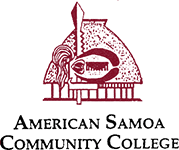American Samoa Community College MOODLE
15 Week Session
This course is designed to provide the students with needed practical skills while working in an agricultural setting during the Summer Institute, fall or spring semesters. (Note: 1 lab credit)
Students will learn about career options available to them in agriculture, natural resources, and family and consumer sciences by interacting with local professionals working in these fields. Each weekly meeting will cover a different discipline, with an introductory presentation followed by a field trip to observe work within that discipline. Field trips will visit local agribusinesses, farms, and government agencies. (Note: 3 lecture credits)
This course opens to all students in developmental studies as an introduction in general agriculture, animal science or natural resource management. Lectures, discussions, and presentations by experts and community members will include topics such as agriculture, livestock, nutrition, breeding, management, and pasture/turf grass, meat processing and marketing. Emphasis will be on swine and poultry production. Students who plan to further their studies of Agriculture beyond the A.S. level must take both this course and ANS 150B. (Note: 2 lecture credits)
A supplement to ANS 150A which provides a complete, in-depth, introductory animal science course. This two-credit discussion and lecture course will provide further detail on livestock anatomy, physiology, nutrition, genetics and global livestock systems. This course is intended to be a more rigorous scientific examination of livestock production. (Note: 2 lecture credits)
An introductory course that contains three general areas which focus on the global importance of forests, emphasizing tropical rain forests, specific forest communities, and their uses in Samoa. The theoretical and practical study and measurement methods in forestry; forest management systems, emphasizing agroforestry, community forestry, conservation, and preservation. (Note: 3 lecture credits and 1 lab credit)
An introductory course that contains three general areas which focus on the global importance of forests, emphasizing tropical rain forests, specific forest communities, and their uses in Samoa. The theoretical and practical study and measurement methods in forestry; forest management systems, emphasizing agroforestry, community forestry, conservation, and preservation. (Note: 3 lecture credits and 1 lab credit)
This course is an introduction to the science of nutrition as it applies to everyday life. The goal is to teach students how to apply the logic of science to their own nutritional concerns. Topics include the six major nutrients: carbohydrates, lipids (fats), protein, vitamins, minerals, and water. The course will also examine the human body, energy balance, weight control, the digestive process, life stages, and diseases as they relate to nutrition and fitness. (Note: 3 lecture credits)
- Teacher: Travis Fleming
